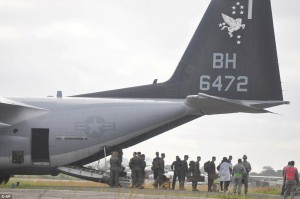Soldiers preparing for deployment to West Africa are given just four hours of Ebola-related training before leaving to combat the epidemic. And the first 500 soldiers to arrive have been holing up in Liberian hotels and government facilities while the military builds longer-term infrastructure on the ground.
For soldiers at Fort Campbell and Fort Bragg preparing for their deployments to West Africa, Mobile Training Teams from the United States Army Medical Research Institute of Infectious Diseases (USAMRIID), based out of Fort Detrick, have been tasked with instructing them on Ebola protocols.
A team of two can train as many as 50 personnel over that four-hour time frame, USAMRIID told The Daily Beast. The training includes hands-on instruction on how to put on, remove, and decontaminate personal protective equipment, followed by a practical test to ensure that soldiers understand the procedures.
“All training is tiered to the level of risk each person may encounter,” said USAMRIID spokeswoman Caree Vander Linden.
The training process sounds daunting: One USA Today report described soldiers being told that Ebola “basically causes your body to eat itself from the inside out” and that Ebola is “worse” than what soldiers encountered in Afghanistan. Others reportedly heard that the disease is “catastrophic” and “frightening… with a high fatality rate,” though the chances of contracting it are low.
“I’ll be honest with you,” one soldier told the newspaper. “I’m kind of scared.”
The military maintains that the risk of contracting the virus is minimal. Ebola is not an airborne disease, and there are no plans for U.S. service members deployed to West Africa to have any contact with sick patients.
“I’m not an epidemiologist, but it’s been shown that this disease is most manifest when handling bodily fluid—blood, other sorts of fluids, and there is no plan right now for U.S. soldiers, sailors, airmen and Marines to do that,” Maj. Gen. Darryl Williams, the officer in charge of America’s operations center in Liberia, told reporters Thursday. “As long as you exercise basic sanitation and cleanliness sort of protocols … I think the risk is relatively low.”
There are just over 500 military service members in West Africa, serving in Senegal and Liberia. A major part of their mission is logistics and construction: The U.S. military is building a 25-bed hospital and 17 Ebola treatment units, as well as training health-care providers in Liberia.
A small number of specially trained soldiers from USAMRIID are at the highest risk, and an exception to Williams’ comment that soldiers are not handling bodily fluids. These service members have been supporting a laboratory in Liberia to run Ebola tests on patient samples, but are also are highly prepared to deal with infectious diseases.
The first 500 American troops in Liberia are so far living in improvised quarters in hotels and government building, according to congressional and military sources. The military is working to transition in the future to “life support areas” that will house the thousands of soldiers who eventually arrive to support the U.S. mission to combat Ebola in West Africa, according to a military spokesman. They are also utilizing local drivers and vehicles to support their movements.
“The hotels are fairly well controlled in terms of access… They have a fairly well-structured screening process going in and out,” a Senate aide briefed by the Pentagon on the military’s procedures told The Daily Beast. “It sounds like they have an adequate level of screening and protective measures in place. That being said, once they move to a self-contained quarters, that will probably be better.”
The military maintains that American service members have only limited interactions with locals on the ground. But some American soldiers are working with the Armed Forces of Liberia on a day-to-day basis, and others are training health-care providers on how to combat the virus.
Further, the military acknowledges that it is currently sharing hotels and businesses with foreign nationals.
“We are here with the permission of the Liberian government and we do not clear out local hotels and businesses during our stay,” said an Army spokesman. “We chose hotels with the safety of our service members in mind, and the hotel staffs monitor all employees and guests and allow us to conduct safety inspections of their facilities to ensure they meet our safety criteria.”
Instead, the military spokesman focused on the precautions that they are already taking: Soldiers based in Liberia have their temperature measured several times per day, and are not permitted to shake hands. They are also are required to frequently wash their hands with a chlorine solution. Some locations even employ chlorine mats that service members are required to wipe their feet on in order to enter.
“The facilities that we’re in have been vetted by our doctors. [They] have gone through the facilities to make sure that they’re safe for our soldiers,” Army spokesman Lt. Col. Michael Indovina said. “We’re very confident. We’ve had very good luck from the time when we’ve arrived on the ground.”
Congress has been slow to give the green light to funding for military operations combating Ebola in Africa, in large part due to initial skepticism over whether there was a sufficient plan for protecting American service members in Liberia.





